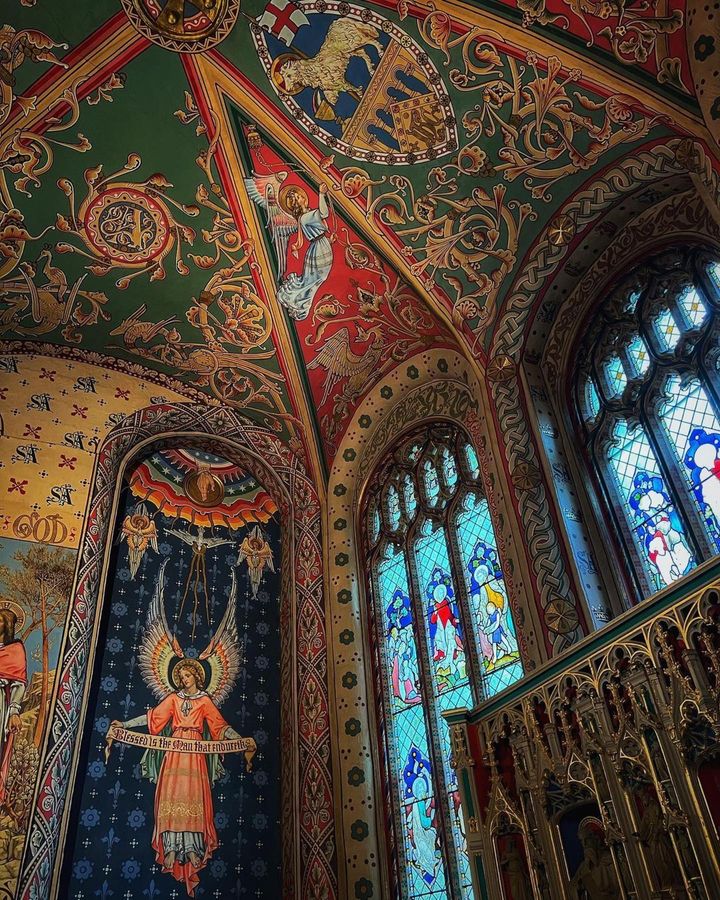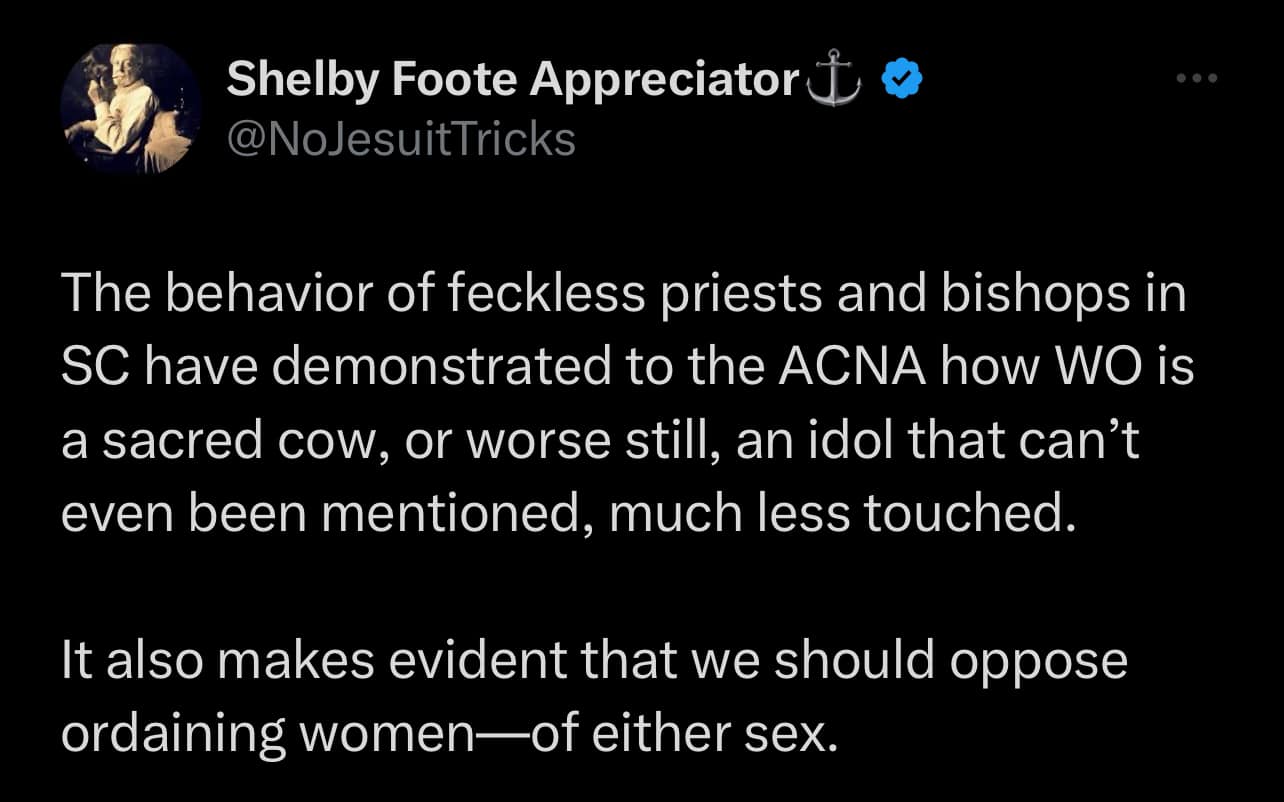From Gavin Ashenden
 Embryo Parson Posted on
Embryo Parson Posted on  Wednesday, January 24, 2024 at 02:39PM
Wednesday, January 24, 2024 at 02:39PM "What Calvin (Robinson) did was to stand up and effectively say that the churches that have a sub-sacramental view of priesthood were in fact confused and involved in a category error in ordaining women to a role in which they represented the masculinity of Jesus, because, like it or not, that's the traditional understanding of priesthood. In the *Apostolic* Church (there is a view which has come down through the generations?), which both Orthodoxy and Catholicism adhere to and protect, and which sacramental Anglicanism borrows from. Sacramental Anglicanism has to decide whether it's Catholic or whether it's Protestant."
 ACNA,
ACNA,  Anglican Church in North America (ACNA),
Anglican Church in North America (ACNA),  Anglican Realignment,
Anglican Realignment,  Anglo-Catholicism,
Anglo-Catholicism,  Church of England,
Church of England,  Continuing Anglicanism,
Continuing Anglicanism,  Episcopal Church,
Episcopal Church,  Fr. Calvin Robinson,
Fr. Calvin Robinson,  Historical Theology,
Historical Theology,  Mere Anglican Conference 2024 ,
Mere Anglican Conference 2024 ,  The Problem of Anglican Identity,
The Problem of Anglican Identity,  Traditional Anglicanism,
Traditional Anglicanism,  Women's Ordination
Women's Ordination An Anglican Priest Overheard on the Mere Anglicanism/Fr. Robinson Debacle
 Embryo Parson Posted on
Embryo Parson Posted on  Tuesday, January 23, 2024 at 10:19PM
Tuesday, January 23, 2024 at 10:19PM "Nobody wants to hear this, but… I take the fiasco with the Mere Anglicanism conference, to be nothing less than a public admission that the advocates of priestesses in the ACNA lack the intellectual wherewithal to debate their opponents. It was a complete total and utter moral and intellectual failure on the part of the lunatic, progressive phalanx in that jurisdiction to be able to debate a rational functioning adult, who disagreed them in public."
Some Post-Mortem on the Mere Anglicanism's Conference Treatment of Fr. Robinson
 Embryo Parson Posted on
Embryo Parson Posted on  Tuesday, January 23, 2024 at 04:16PM
Tuesday, January 23, 2024 at 04:16PM Following up on this. I will provide updates as more of such rolls in.
BREAKING: Mere Anglicanism Conference "Cancels" Calvin Robinson, Fr. Mark Marshall
Can Two Walk Together, Except They Be Agreed?, Fr. Jay Thomas at The North American Anglican
Canceling Calvin for Being Calvin: Fr. Calvin Robinson Exposes the Folly of “Dual Integrities”, Fr. Matt Kennedy
Fr. Calvin Robinson and Feminism, Solomon's Corner video commentary
An Anglican Tempest in Charleston, Bethel McGrew
Smoking Gun? Fr. Robinson responds to the Rev'd Jeff Miller's spin doctoring.
Press Release concerning The Reverend Father Calvin Robinson, The Nordic Catholic Church
Cancelling Calvin Robinson: The American Anglican Crisis as Feminism Takes Truth & Integrity Hostage, Gavin Ashenden. (Don't miss this one. There are some real jewels here.)
Fr Calvin Robinson Interview: What Happened at the Mere Anglicanism Conference?, Fr. James Gadowski interviews Fr. Robinson
Mere Anglicanism, Mere Censorship! Calvin Robinson Speaks Out!, Fr. Brett Murphy interviews Fr. Robinson
The Great Anglican Disappointment: Calvin Robinson, Bishop Chip, and Women in the Church, Anne Kennedy
Rent Asunder? Calvin Robinson at Mere Anglicanism, Stand Firm Podcast
Will Orthodox Anglicans Please Stand Up?, Jonah Saller at Eastword
Statement of Forward in Faith North America
What's The Big Deal About Women's Ordination?, Fr. Mark Marshall
An Open Letter to the College of Bishops, Rev. Andrew Brashier at The North American Anglican
The Day the Gloves Came Off: An End to Detente in the ACNA, Fr. Lee Nelson at The North American Anglican
The Parting of Ways: Calvin Robinson's Case
"A voice emerging from the mist,
Luring words she could not resist,
'Listen to me,' the serpent hissed
To Eve, the proto-feminist." - Quoted or penned by one David Rudd
 Anglican Church in North America (ACNA),
Anglican Church in North America (ACNA),  Anglican Follies,
Anglican Follies,  Anglican Orders,
Anglican Orders,  Anglican Realignment,
Anglican Realignment,  Continuing Anglicanism,
Continuing Anglicanism,  Critical Race Theory,
Critical Race Theory,  Episcopal Church,
Episcopal Church,  Feminism,
Feminism,  Fr. Calvin Robinson,
Fr. Calvin Robinson,  Historical Theology,
Historical Theology,  Mere Anglican Conference 2024 ,
Mere Anglican Conference 2024 ,  Neo-Anglicanism,
Neo-Anglicanism,  Old Catholics,
Old Catholics,  Patriarchy,
Patriarchy,  The Problem of Anglican Identity,
The Problem of Anglican Identity,  Traditional Anglicanism,
Traditional Anglicanism,  Women's Ordination
Women's Ordination Fr. Calvin Robinson "Cancelled" at the Mere Anglicanism Conference
 Embryo Parson Posted on
Embryo Parson Posted on  Sunday, January 21, 2024 at 07:47PM
Sunday, January 21, 2024 at 07:47PM 1/22/24 Update: The "blowup" I mentioned below refers to the explosion that occurred in the comments section of the Mere Anglicanism Facebook page. Mere Anglicanism has now apparently deleted comments and turned off commenting. I managed to get screen shots of most of them before that happened.
__________________________________________
The good news is that it blew up in ACNA's face. The bad news is that ACNA will never, ever address the problem. It has chosen to live with its oxymoronic and suidical "dual integrities" policy. Trads need to get out of there. Just do it, already.
Cancelled From Mere Anglicanism
John Jewell, Crypto-Puritan?
 Embryo Parson Posted on
Embryo Parson Posted on  Sunday, January 21, 2024 at 07:43PM
Sunday, January 21, 2024 at 07:43PM "Jenkins’ basic thesis is that in Jewel’s mainly controversial and polemical works we have the public figure of the faithful and loyal bishop, but in his private correspondence, mainly with his Swiss reformer friends, we see a frustrated academic with distinct puritan leanings, bemoaning the lack of reforming progress in his native England. Jenkins terms Jewel as ‘an iconoclast in a prelate’s vestments’ and puts this observable dissonance down to the underlying tension in many of the English reformers—a pronounced Erastian worldview giving the godly prince, in this instance Elizabeth, sovereignty in both civil and ecclesiastical realms, yet solidly maintaining the traditional Protestant sola scriptura as the final arbiter in doctrinal authority. This would inevitably lead to the bloodshed of the Civil War in the next century, as the English church had no recourse after the monarch’s undisputed sovereignty."
Read the rest here.
"The only question now is how will the ACNA deal with ACNAtoo."
 Embryo Parson Posted on
Embryo Parson Posted on  Sunday, January 21, 2024 at 07:38PM
Sunday, January 21, 2024 at 07:38PM "Sadly, we have our suspicions."
Yes, Virginia, We Are Sacrificing Priests
 Embryo Parson Posted on
Embryo Parson Posted on  Sunday, January 21, 2024 at 07:14PM
Sunday, January 21, 2024 at 07:14PM From a fellow priest:
"One of the most polarizing positions one can take in theological discourse is with regards to the sacrifice of the Mass. Or, put differently, whether one believes that the Eucharist is a sacrifice or merely a memorial of one. This question ultimately centers around the question of what worship is. For more catholic minded folk, worship necessarily entails that there be a sacrifice offered. For the more Evangelically minded spirit, any notion of our worship involving a sacrifice is either superstitious or a sign of the times (depending on your flavor of Evangelicalism); and, If you’re Reformed, it’s both of those.
In this article. I would like to consider whether or not the offering of a sacrifice is essential to worship, and more particularly whether or not the Eucharist is considered a sacrifice. In the midst of this, we will also look briefly upon the Incarnation and see what it informs us about our main topic."
Martin Luther: "Justification is the Article by which the Church Stands and Falls"
 Embryo Parson Posted on
Embryo Parson Posted on  Friday, September 22, 2023 at 02:46PM
Friday, September 22, 2023 at 02:46PM N.T. Wright on Martin Luther Not Being All That Right
"The point here being that whenever anyone says 'Luther was wrong,' it doesn’t matter what he says next. As soon as you grant Luther’s error, you raise serious questions as to the legitimacy of the Protestant Reformation."
And that, my friends, is the nub of it. Sanders, Dunn, Wright, et al. have arguably taken the legs out from under the entire Protestant Experiment.
What's left? How about the Catholic Church, East and West, that *stood*, without solafidianism, for 1,000 years before the Great Schism and 1,500 years before Reformation, and which still stands 500 years after it? When one carefully and honestly observes the sweep of Protestant history and where it has brought Protestants today, he must ask himself which church truly no longer stands.
See here for McGrath's account of how later Caroline divines began chafing at Luther's error, a version of which unfortunately made its way into certain Anglican formularies.
 39 Articles,
39 Articles,  Anglican Formularies,
Anglican Formularies,  Anglican Realignment,
Anglican Realignment,  Anglo-Calvinism,
Anglo-Calvinism,  Anglo-Catholicism,
Anglo-Catholicism,  Calvinism,
Calvinism,  Caroline Divines,
Caroline Divines,  Church Fathers,
Church Fathers,  Church of England,
Church of England,  Continuing Anglicanism,
Continuing Anglicanism,  Crypto-Puritanism,
Crypto-Puritanism,  Dogmatic Theology,
Dogmatic Theology,  Eastern Orthodoxy,
Eastern Orthodoxy,  English Reformation,
English Reformation,  Future of Protestantism,
Future of Protestantism,  Historical Theology,
Historical Theology,  Holy Scripture,
Holy Scripture,  John Calvin,
John Calvin,  Justification By Faith,
Justification By Faith,  Lutheranism,
Lutheranism,  Martin Luther,
Martin Luther,  N.T. Wright,
N.T. Wright,  New Perspective on Paul,
New Perspective on Paul,  Oxford Movement,
Oxford Movement,  Roman Catholicism,
Roman Catholicism,  The Gospel,
The Gospel,  Tractarian Divines,
Tractarian Divines,  Traditional Anglicanism,
Traditional Anglicanism,  Why Anglicanism?
Why Anglicanism? David Bentley Hart - Do Women Make Better Priests?
 Embryo Parson Posted on
Embryo Parson Posted on  Wednesday, September 20, 2023 at 05:59PM
Wednesday, September 20, 2023 at 05:59PM Note that his argument rests entirely on the tired, old anecdotal "argument", spouted by many of DBH's fellow liberal-leftists, that many women upon whose head some errant bishop laid his hand are just more naturally suited for the priesthood. Forget about the theology of the matter. Forget about Apostolic and Catholic precedent. Forget about the Church:
Hart concludes his denunciation of my review with some revealing statements. He has “never been especially concerned about terms like ‘orthodoxy’ and ‘heterodoxy.’” He “was never a champion of the kind of Christianity” I believe in, creedal orthodoxy. From the first, he has been “a metaphysical monist of the Neoplatonic and Vedantic variety.” In other words, Hart has never been a man of the Church, devoted to its orthodoxy, dedicated to the emerging wisdom of the Christian community and its Great Tradition. He is an independent religious thinker who urges his readers to adopt his own private method of theological interpretation. Toward the end of Tradition and Apocalypse, he tells believers they can liberate themselves by “a peculiarly modern maxim: sapere aude—dare to be wise.” In the end, he implies, the truth about God is something that individuals must figure out for themselves. Hart is a lonely theologian, and he would leave us alone, apart from the Christian community who have thought together about redemption by the God of Israel.
I wonder what Fr. Robert Hart has to say about his brother's argument, since he is a priest of the Anglican Catholic Church, which rejects the practice of ordaining women. After all, per Robert, his brother is the most intelligent and learned theologian Christianity has ever produced, and all his critics are therefore fools. It'll be interesting to see whether it's crickets or whether it's this standard line of "reasoning" he regularly employs.
ACNAtoofar
 Embryo Parson Posted on
Embryo Parson Posted on  Wednesday, September 20, 2023 at 05:45PM
Wednesday, September 20, 2023 at 05:45PM To add insult to injury, they also claim the following in the statement: “Though we hold an assortment of personal views on gender and sexuality, we are united in our position of love and care for all survivors of abuse, with a particular tenderness for those facing social marginalization on top of abuse trauma.” But their clear statements of belief on the nature of sexual identity belies the truth that they do not, in fact, hold an assortment of personal views on gender and sexuality. They are espousing one view that is in stark contrast to the scriptures and the Church that ACNAtoo is seeking to denounce. In light of their demand for unconditional surrender of biblical and moral truth, there is not any room for respectful disagreement even as we share concern for survivors.
Given the animus of ACNAtoo towards biblical teaching on human identity, sexuality, and marriage, their disdain for “theological purity” and the Fundamental Declarations upon which this Church stands, ACNAtoo has forfeited whatever voice it once had among the “various publics” to which the presenting bishops in Ruch vs. Beach once referred. They are now demanding nothing less than an unconditional surrender of the very way we have sought to faithfully read and obey God’s word in the spirit and love of Jesus Christ. They have defined the issues to always reflect abuse even if the offending parties are simply holding the biblical line.
Or is it merely ACNA's LATCON mentality coming home to roost?
Time to fix it, boys.
By All Means, Robert. . . .
 Embryo Parson Posted on
Embryo Parson Posted on  Wednesday, September 20, 2023 at 03:20PM
Wednesday, September 20, 2023 at 03:20PM Go get that Nth booster. "Poor brainwashed knucklehead." ;>)
Is There an Intelligible Anti-Vax Position?
FDA adds a warning to Covid-19 vaccines about risk of heart inflammation (CNN)
Risk of death following COVID-19 vaccination or positive SARS-CoV-2 test in young people in England (NIH/NLM)
Carl Sagan’s Final Warning on the Importance of Scientific Skepticism From the article:
". . . as Dr. Vinay Prasad pointed out, no party has a monopoly on science; but it’s clear that many of the policies the 'pro science' party were advocating the last three years were not rooted in science.
'The ‘pro science’ party was pro school closure, masking a 26 month old child with a cloth mask, and mandating an mrna booster in a healthy college man who had COVID already,' tweeted Prasad, a physician at the University of California, San Francisco.
Today we can admit such policies were flawed, non-sensical or both, as were so many of the mitigations that were taken and mandated during the Covid-19 pandemic. But many forget that during the pandemic it was verboten to even question such policies.
People were banned, suspended, and censored by social media platforms at the behest of federal agencies. 'The Science' had become a set of dogmas that could not be questioned. No less an authority than Dr. Fauci said that criticizing his policies was akin to 'criticizing science, because I represent science.'”
____________________________________________________________

Asbury Is Having A Revival (Again)
 Embryo Parson Posted on
Embryo Parson Posted on  Sunday, September 17, 2023 at 04:04PM
Sunday, September 17, 2023 at 04:04PM I missed this article by R. Scott Clark (Reformed) last February.
Despite the confidence with which those in the R&R (revival and revivalism) tradition speak about revivals, the truth is that there is typically little to show for them. Those of us in the confessional Reformation traditions would look at church attendance as an expected fruit of revivals but there is no evidence of increased church attendance after the First Great Awakening. In fact, attendance dropped. The genius of the so-called Great Awakenings is that, for the most part, they divorced religion and piety from the church, a pattern which American evangelicals have continued. Graham, Carl Henry, and Harold Ockenga, who pioneered the post-WWII “neo-evangelical” movement, intentionally marginalized the visible church as they sought unity among evangelicals around a high doctrine of Scripture. Sister Aimee held huge rallies before WWII and Billy Graham held a “revival” in LA in 1949, but to what effect? Yes, the Lord used those things to bring people to Christ but for all the “magic and noise” (H. L. Mencken), things in LA, London, and elsewhere soon returned to normal.
The Rise and Fall of the Evangelical Elite
 Embryo Parson Posted on
Embryo Parson Posted on  Saturday, September 2, 2023 at 12:23AM
Saturday, September 2, 2023 at 12:23AM May their fall be hard and permanent.
It was the elite evangelical response to COVID that finally destroyed their credibility. It solidified the already widespread suspicion that their role in society is to provide a theological veneer to regime narratives. They exhibited naïve trust in and absurd deference to institutions and the “experts” who openly lied and laughed off charges of tyranny as they closed playgrounds and schools, dumped sand in skate parks, locked people in their homes, and insisted that loved ones die alone. One notable pastor-theologian, Jonathan Leeman, authored several articles against churches that defied COVID restrictions, including against MacArthur’s church. In the height of the pandemic and while his church was forbidden from meeting, Leeman (being very on-brand) attended a crowded BLM protest, even inviting his church to join him.
Many of us refused to comply. Turns out we were right.
What Is Salvation?
 Embryo Parson Posted on
Embryo Parson Posted on  Tuesday, August 29, 2023 at 10:31PM
Tuesday, August 29, 2023 at 10:31PM "Salvation is not an event—even an event as important as accepting forgiveness for your sins. Salvation is instead an ongoing process during this life and beyond it that begins with receiving God’s forgiveness, continues with transformation more and more into the model of human existence that Jesus offered, and concludes after death when our bodies are transformed into ones that are free of the effects of suffering and death and we can bask fully in the joy of God’s presence. The right response to the question of “when did you get saved” is neither “When I accepted Jesus into my heart” or “When I was baptized”; the right answer is “I was saved by Jesus on the cross; I am being saved by God helping me to becoming more like Jesus every day; and I will be saved when my I am transformed after death and can enter into the joy of God’s presence that goes on forever.”
Ramsey on the Caroline Divines and the Study of the Fathers
 Embryo Parson Posted on
Embryo Parson Posted on  Tuesday, August 29, 2023 at 03:17PM
Tuesday, August 29, 2023 at 03:17PM "Whereas the **Edwardian and Elizabethan divines had been interested in the Fathers chiefly as a means of proving what had or had not been the primitive doctrine and practice**, the Caroline divines went farther in using the thought and piety of the Fathers within the structure of their of their own theological exposition. Their use of the Fathers had these two noteworthy characteristics. (1) **Not having, as did the Continental Reformers, a preoccupation with the doctrines of justification or predestination** they followed the Fathers of the Nicene Age in treating the Incarnation as the central doctrine of the faith. Indeed a feeling of the centrality of the Incarnation became a recurring feature of Anglican divinity, albeit the Incarnation was seen as S. Athanasius saw it in its deeply redemptive aspect. (2) Finding amongst the Fathers the contrast of Greek and Latin divinity, the Anglican divines could be saved from western narrowness, and were conscious that just as the ancient undivided Church embraced both East and West so too the contemporary Catholic Church was incomplete without the little known Orthodox Church of the East as well as the Church in the West, Latin, Anglican and Reformed. The study of the Fathers created the desire to reach out to Eastern Christendom. Thus did Anglican theology find in the study of the Fathers first a gateway to the knowledge of what was scriptural and primitive, subsequently a living tradition which guided the interpretation of Scripture, and finally a clue to the Catholic Church of the past and the future: in the words of Lancelot Andrewes 'the whole Church Catholic, Eastern, Western, our own." - Archbishop of Canterbury Michael Ramsey, "The Ancient Fathers and Modern Anglican Theology", Sobornost, Series 4: no. 6 (Winter-Spring 1962), p. 290. (Emphases in asterisks mine.)
______________________________
"No one doubts that Cranmer, Jewel, or Hooker were deeply committed to the witness of the ancient Church and the Fathers. The real question is whether or not their reading of Christian antiquity and the Church Fathers was superior to that of the Caroline divines, non-jurors and Tractarians (the theological lineage from which Anglo-Catholicism derives)."
 Anglican Communion,
Anglican Communion,  Anglican Formularies,
Anglican Formularies,  Anglican Spiritual Life,
Anglican Spiritual Life,  Anglo-Calvinism,
Anglo-Calvinism,  Anglo-Catholicism,
Anglo-Catholicism,  Calvinism,
Calvinism,  Caroline Divines,
Caroline Divines,  Church Fathers,
Church Fathers,  Church of England,
Church of England,  Continuing Anglicanism,
Continuing Anglicanism,  Eastern Orthodoxy,
Eastern Orthodoxy,  English Reformation,
English Reformation,  Evangelicalism,
Evangelicalism,  Grace,
Grace,  Historical Theology,
Historical Theology,  Holy Scripture,
Holy Scripture,  Justification By Faith,
Justification By Faith,  Oxford Movement,
Oxford Movement,  Richard Hooker,
Richard Hooker,  Roman Catholicism,
Roman Catholicism,  The Gospel,
The Gospel,  The Problem of Anglican Identity,
The Problem of Anglican Identity,  Tractarian Divines,
Tractarian Divines,  Traditional Anglicanism,
Traditional Anglicanism,  Why Anglicanism?
Why Anglicanism? "We Three. We Happy Three!"
 Embryo Parson Posted on
Embryo Parson Posted on  Thursday, August 24, 2023 at 09:50PM
Thursday, August 24, 2023 at 09:50PM I'll be content to let the readers decide. The transcript of the Christian Century interview is quite lengthy, but deserves your time and energy.
"Obviously, the sort of monism to which I’m drawn is a metaphysical monism of a more Neoplatonic or Vedantic sort." - David Bentley Hart
"Ross M. Allen is designated term minister at South Acton Church in Acton, Massachusetts."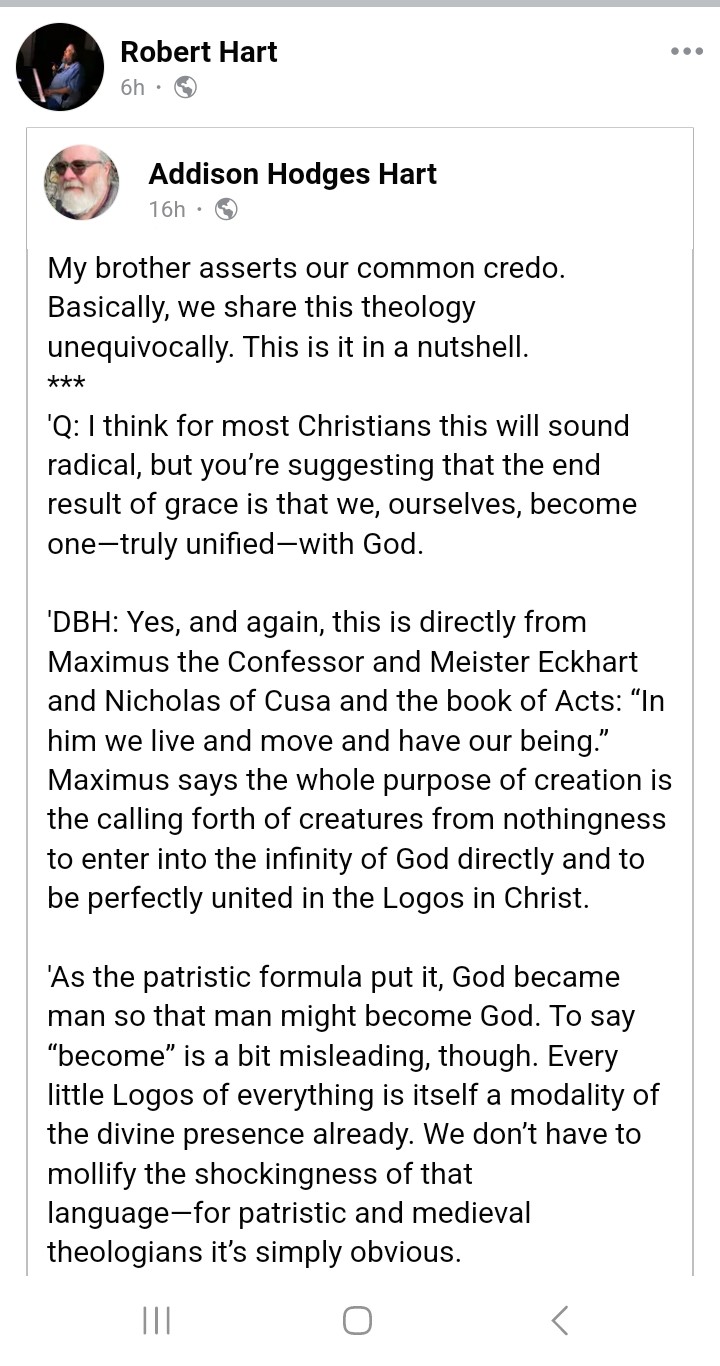
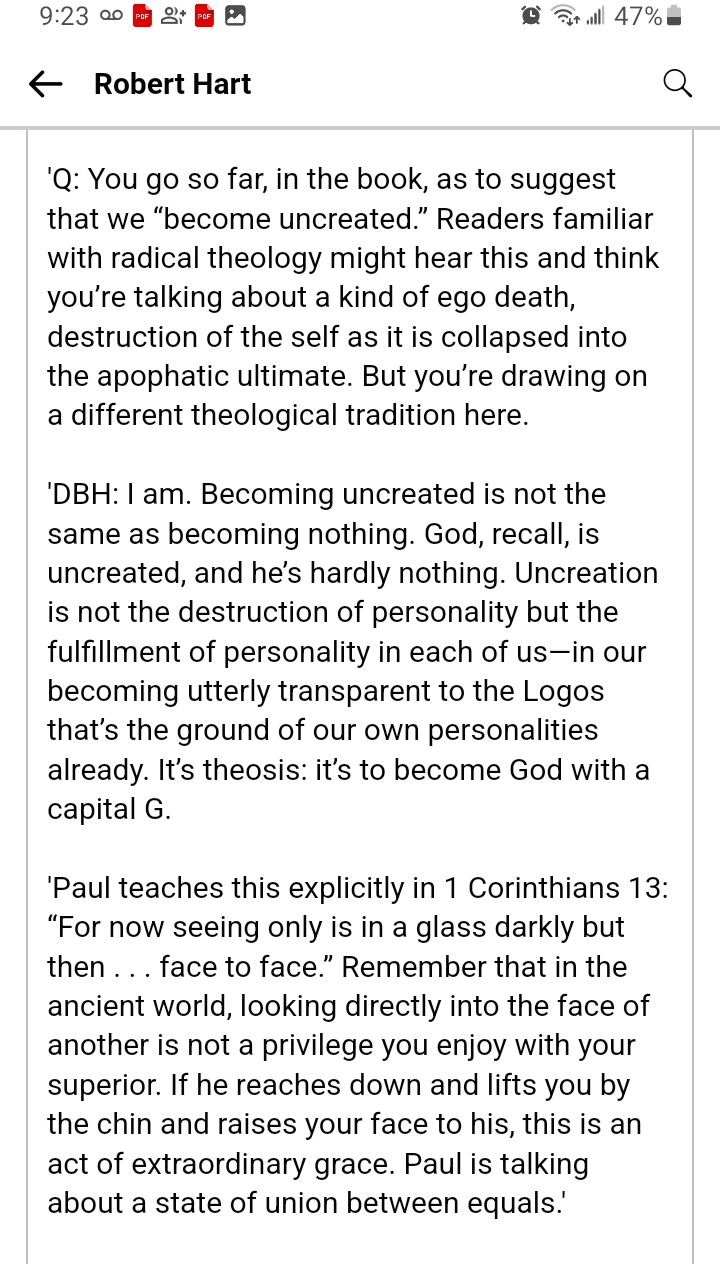
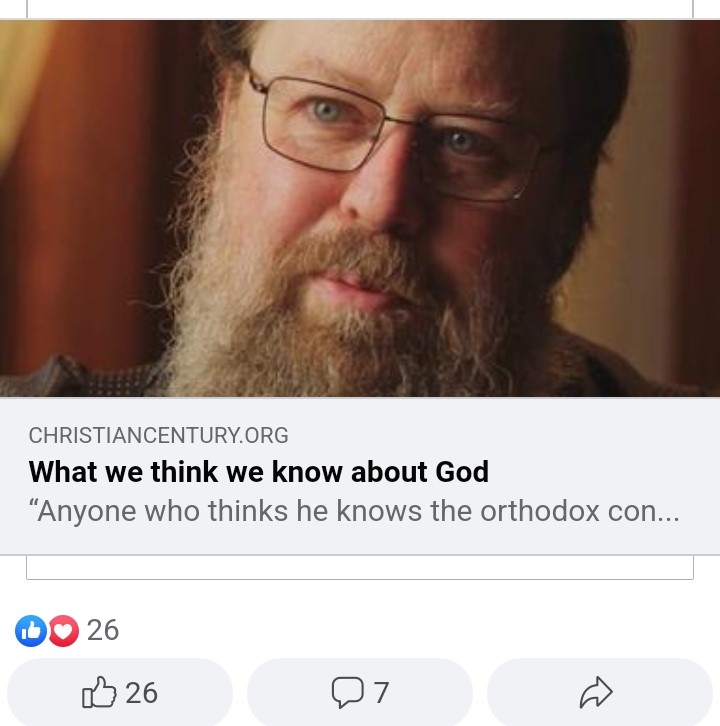

 Addison Hodges Hart,
Addison Hodges Hart,  Church Fathers,
Church Fathers,  David Bentley Hart,
David Bentley Hart,  Eastern Orthodoxy,
Eastern Orthodoxy,  Fr. Robert Hart,
Fr. Robert Hart,  G3 Synod,
G3 Synod,  Gnosticism,
Gnosticism,  Grace,
Grace,  Historical Theology,
Historical Theology,  Liberal Protestantism,
Liberal Protestantism,  Liberal-leftism,
Liberal-leftism,  Mysticism,
Mysticism,  Panpsychism,
Panpsychism,  Perennialism,
Perennialism,  Roman Catholicism,
Roman Catholicism,  The Hart Brothers,
The Hart Brothers,  Traditional Anglicanism,
Traditional Anglicanism,  Traditional Conservatism
Traditional Conservatism Hans Boersma on St. Irenaeus: Justification as Participation
 Embryo Parson Posted on
Embryo Parson Posted on  Sunday, August 20, 2023 at 10:14PM
Sunday, August 20, 2023 at 10:14PM Justification within Participation: Irenaeus in Ecumenical Dialogue.
It would be difficult precisely to align Irenaeus’s views with the approaches of Catholics, traditional Protestants, or adherents of the new perspective. To be sure, it is possible to make some observations that have a bearing on such discussions, and by way of conclusion I should perhaps begin there. First, Irenaeus does not hold to a forensic imputation of Christ’s righteousness. When he uses the imputation language of Romans 4:3 and Galatians 3:6, it is clear that he holds that it is faith, not Christ’s righteousness, that God imputes to us. In traditional dogmatic language, we could say that it is faith as our own inherent righteousness that Irenaeus believes God (juridically) imputes to us. In terms of this key issue between Catholicism and Protestantism, Irenaeus would unambiguously seem to side with the Catholic position.
Second, when we ask whether there is also a justification by works for Irenaeus, the answer is slightly more complex. Irenaeus almost entirely avoids the language of ‘justification by works’. Nor does he distinguish clearly between initial and continuing justification – the former perhaps being by faith only and the latter also by works. Irenaeus does, however, speak of Abraham ‘righteously’ ( juste) following the Word of God and makes clear that both the patriarchs and we today have the ‘righteousness of the law’ written on our hearts. Clearly, Irenaeus would not have had any difficulty accepting that God imputes also this righteousness to us – even if he does not use the language of justification by works. To be sure, the absence of ‘merit’ discourse in Irenaeus holds some significance. Unlike the later Catholic tradition, Irenaeus does not suggest that we merit eternal life condignly or properly. Because the notions of recapitulation and participation form the broad framework within which Irenaeus expounds his doctrine of justification, our righteousness is always a (partial) participation in God. The language of condign merit does not fit well within such a participatory framework.
Third, the new perspective retrieves a genuine patristic insight when it describes Paul’s ‘works of the law’ as Jewish identity markers. For Irenaeus, the main identity markers are circumcision, Sabbath, and sacrifices. At the same time, however, for Irenaeus it is not only these three elements that are ‘works of the law’ and that function as identity markers. Rather, he treats the entire law (except the Decalogue) as an identity marker, and presumably he would have regarded any observance of the law as observance of works of the law (or, we could say, as an attempt to be justified by works of the law). For Irenaeus, it is faith (in Christ) and love (of God and neighbor) that mark the identity of Christians and that constitute true fulfillment of the law. In no way, then, does Irenaeus worry that Jewish law observance might imply reliance on human achievement or merit. The problem with law observance is, instead, (1) that it puts us back into an earlier, inferior stage of the divine pedagogy; and (2) that it would probably also entail the observance of additional manmade laws and traditions.
Everything I have said so far about justification by way of conclusion must be refracted through the lens the two key concepts of recapitulation and participation. Irenaeus, rightly I think, does not treat justification as the central category by which to understand salvation. The two key concepts are recapitulation (by which Christ, objectively, incorporates humanity in his salvific life) and participation or deification (by which we, subjectively, are conformed through faith and love to the character of God in Christ). Justification, in other words, while it retains a juridical aspect, is for Irenaeus one element within a broader soteriology, which as a whole is ontological in character. Our faith and righteousness enable us to share in Christ as the new humanity, the second Adam. And by sharing in Christ we are made alive and so rendered immortal; in other words, we are divinized as children of God. This means salvation is not an external or nominal affair but is a matter of real or ontological participation in the life of God.
The Western debates about justification would benefit, it seems to me, from a good dose of Greek patristic theology. At the least, it would take the sharp edges off some of the debates surrounding faith and works. Catholics would perhaps become somewhat more cautious about the language of meriting eternal life. The Christian pilgrimage of love is, after all, simply an initial participation in God’s own character by virtue of Christ’s recapitulation. In no way are works autonomous human achievements. Although Catholic theology recognizes this – it is important, for example, to recall that Aquinas speaks of condign merit in the context of deification – nonetheless, a preponderance of merit discourse may serve to highlight the juridical at the cost of the ontological. Justification (and the language of merit) should play only a subservient role in the doctrine of salvation.
Traditional Protestants have perhaps the most to gain from a retrieval of Irenaeus’s understanding of justification. Forensic imputation of Christ’s righteousness foregrounds a sensibility that is entirely legitimate – namely, that it is only by seeking refuge in Christ that we can be saved. But the logic of forensic imputation is not the right instrument to shore up this valid concern. After all, Paul does not use the language of imputation in connection with Christ’s righteousness but employs it to articulate the imputation of the righteousness of our own faith (Rom. 4:3; Gal. 3:6). Theologically, what is at stake here is the recognition that when God justifies us he transfigures us. The language of simul iustus et peccator is particularly troubling – at least, whenever it is meant to imply that Christ’s righteousness simply covers over our own continuing sinfulness. Such a strictly forensic imputation is also at odds, I think, with some of the better Reformation insights, which recognize that it is by means of genuine union with Christ that we are justified and sanctified. The focus on union with Christ would, if consistently maintained, lead to a retrieval of the Irenaean notions of recapitulation and theosis. Irenaeus, I think, had it right: justification is a subset of our deifying union with God in and through the recapitulation of humanity in Christ.
Former Presbyterian Lays Bare a Key Protestant Dilemma
 Embryo Parson Posted on
Embryo Parson Posted on  Sunday, August 20, 2023 at 12:59AM
Sunday, August 20, 2023 at 12:59AM





